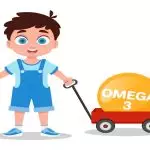
Coronavirus in Toddlers: Symptoms & Treatment
5 min readWritten by Ambili Kartha

The COVID-19 pandemic has caused a lot of fear and panic. However, most people seem to think it is impossible for there to be coronavirus in toddlers.
While it is true that toddlers are not affected as often, it is not unheard of for toddlers to contract the disease. Some factors may make your toddler more, or less, at risk. This article sheds some light on such topics so that you can be prepared for.
Can Toddlers Get Coronavirus?
According to many studies, the possibility of contracting coronavirus is noticeably low among children younger than 10 to 14 years. However, this does not mean toddlers won’t catch the coronavirus. Toddlers can get coronavirus, and even if they don’t exhibit any symptoms, they can transmit it to others.
According to another study, a small proportion of toddlers tend to develop severe symptoms that necessitate ICU admission and prolonged ventilation. However, in the majority of cases, coronavirus is found to have a mild effect in toddlers. And fatal outcomes are, in general, very rare.
Therefore, it is important to use precautions and prevent infection in toddlers as well as adults.
Why do Toddlers React in a Different Way to Coronavirus?
According to some studies conducted in households with respect to adults, children under 12 years are more than 50% less at risk of getting covid if there is an infected member in the home. Toddlers also fall under this group, according to this study.
The exact reason why the effect of coronavirus in toddlers differs from that of adults is yet to be found out.
According to some experts, toddlers more often contract other virus-related diseases like a common cold. Since toddlers often get colds, their immune systems might be geared up to some extent to shield against the coronavirus.
Another theory is that, unlike an adult’s immune system, the immune system of toddlers with coronavirus will not overreact to the microbe. Therefore, they are less likely to develop fatal reactions. According to this theory, one of the root causes of getting sick due to coronavirus is the overreacting immune system. Many times this overreaction can cause more damage to different organs of the body, especially the heart and lungs.
Toddlers and Coronavirus: Who All are at Risk?
Even though the toddlers are less likely to contract COVID-19, those with some underlying health conditions are more at risk of contracting COVID-19.
- Toddlers who suffer from asthma and other breathing issues are at higher risk
- Those suffering from obesity or diabetes may be more susceptible to COVID-19
- Toddlers who have heart disease, and those who suffer from conditions that affect their nervous system and metabolism are at risk
- Those who had a premature birth are at risk
- Toddlers whose immune systems are compromised are more likely to contract the Coronavirus

Covid-19 Symptoms in Toddlers:
Even after contracting covid, many toddlers exhibit no symptoms (provided they have no underlying health issues). However, sometimes toddlers may exhibit some symptoms. Coronavirus in toddlers symptoms may vary with the toddler. The main coronavirus symptoms in toddlers comprise:
- Low-Grade Fever
- Extreme Tiredness
- Nasal Congestion and Runny Nose as in Common Cold
- Cough
- Throat Pain
- Whole-Body Ache
- Abdominal Pain
- Vomiting
- Diarrhea
- Loss of Appetite
- Loss of Smell and Taste
As a toddler is not big enough to communicate discomfort (they may complain about the pains though), if you doubt s/he is exposed to the virus, then closely monitor the toddler. You can even ask questions to the toddler keeping the above-mentioned signs in your mind. For example, you can ask them if they are getting the flavor and taste of the food.
Corona Virus in Toddlers: When to Seek Medical Attention?
If you doubt your toddler is infected, it is very important to closely monitor the child and contact the doctor as soon as possible.
Any of the following signs necessitate immediate medical attention:
- Respiratory Issues
- The Sudden Appearance of Rashes
- Not Eating Well
- Bluish Lips
- Constant Sleeping and Very Inactive
- Sunken Eyes or Lethargic Behavior
- Constant Vomiting and Diarrhea
Learn About a Rare But Possible Complication of Coronavirus in Toddlers:
Even though rare, a potentially severe and perilous health condition can occur in a toddler as a delayed complication of Coronavirus infection. It is called MIS-C (Multisystem Inflammatory Syndrome in Children).
MIS-C is a condition in which multiple organs of the toddler, like lungs, heart, kidneys, digestive organs, eyes, brain, become inflamed. It is a life-threatening condition. Children from 2 to 15 years are at the risk. Toddlers, unfortunately, come under this parameter.
Therefore watch out for the following signs for a period of time after the toddler has recovered from COVID- 19.
- Extreme Weakness
- Sleeplessness and Irritability without any Reason
- Swollen Hands and Feet
- Swollen Lymph Nodes in the Neck
- Neck Pain
- Red Cracked Lips
- Strawberry-Red Tongue
- Stomach Ache
- High Fever that lasts more than 48 hours
- The Sudden Appearance of Vomiting and Diarrhea
- Redness in the White Part of the Eyes
- Red rashes
Seek immediate medical attention once you detect any of the above signs in the toddler. As already mentioned not all toddlers infected with the coronavirus will develop this complication. But you can’t rule out its possibility.
Coronavirus in Toddler: Precautions
If you have a toddler with coronavirus in your home it is important to follow some precautionary measures. You can minimize the risk of spreading coronavirus from your toddler to other family members by:
- Choosing only one person to babysit (most preferably, mom)
- Follow the protocol of quarantine strictly (in case the doctor suggests home quarantine)
- Never use the common bathroom. Always choose a bath attached room.
- Also, the room should be ventilated enough to allow the sunlight to come in and air to circulate
- Make sure all other members in the family also strictly follow the protocol like wearing the mask, washing hand frequently, etc
Coronavirus in Toddlers: Prevention
- Make sure the babysitter (if you have one) has minimal exposure to other people.
- Never encourage an indoor playing date during this time of the pandemic.
- Make sure the room of baby is well ventilated
- Urge the toddlers to wash their hands often
- Teach them to maintain social distancing
- Make them wear a mask whenever you take them out
- Clean the floor and other surfaces of the toddler’s room frequently

Coronavirus in Toddlers: Treatment
If the corona test of your toddler is positive, depending on the symptoms developed by the toddler, the doctor will either insist on treating the toddler at home or admit the child to the hospital. When it comes to treating the toddler at home, unlike adults, there should be a caretaker full time (more often the mother).
As you all know, since there is no specific treatment for corona, the medication will be 100% focused on soothing the symptom. Also, make sure the toddler is having plenty of liquids, rest, and take all measures to keep the child comfortable.
Despite being very dangerous, there is no need to panic if you think your toddler is at risk. Following the precautions, like washing hands, using hand sanitizer, and wearing a mask, can go a long way in preventing your toddler from contracting the virus.
If they start showing symptoms of coronavirus, do not hesitate in taking them to the hospital. Remember: every minute helps. Just make sure you follow all the rules, and your toddler should be just fine.

Ambili Kartha,B.Sc (Zoology)
Responses (0)
Want curated content sharply tailored for your exact stage of parenting?
Related articles
Sponsored content
Discover great local businesses around you for your kids.
Get regular updates, great recommendations and other right stuff at the right time.













